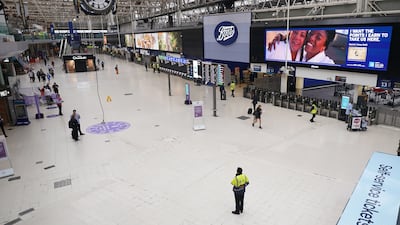Britain is facing a weekend of travel chaos because of rail strikes, which will mean only a fifth of all services in action and half of all lines closed.
The third day of the largest railway industrial action to hit the UK in more than 30 years is on Saturday, and is expected to bring trains to a halt while disrupting the plans of millions.
The setbacks will cap a week of misery for commuters, many of whom were forced to resort to using overcrowded buses or taxis to get to work or school to sit exams. Others resorted to working from home in an attempt to avoid long queues at bus stops and heavier-than-usual traffic.
About 40,000 members of the Rail, Maritime and Transport (RMT) union at Network Rail and 13 operators are staging three days of walkouts in a dispute with the government over pay, jobs and working conditions.
Operators are telling passengers they should “only travel by train if necessary” and to check their journey in advance.
Those with long-standing plans to travel on Saturday ― such as for a day trip or holiday, a visit to friends or relatives, or to attend an event ― may be keen to press ahead with their trip despite the industrial action.
A rail industry source told the PA news agency that while stations were “relatively quiet” during the first two strike days, there is “a nervousness” about what will happen on Saturday.
The weather forecast for much of the UK is pleasant for Saturday, with temperatures predicted to reach 25ºC in Bristol and 20ºC in London.
Many seaside resorts will have no rail services on Saturday, including Bournemouth in Dorset; Blackpool in Lancashire; Margate in Kent; Llandudno, north Wales; and Skegness in Lincolnshire.
Cornwall will also have no train connections.
Services across Britain will primarily be restricted to main lines, but even those will be open only between 7.30am and 6.30pm.
After Saturday’s full-day walkout, disruption will continue into the following morning, as it has throughout this week. Although full-day strikes were held only on Tuesday and Thursday, the effects of the action were felt by commuters on Wednesday and Friday also.
Only 60 per cent of trains were expected to run on Friday, mainly because of a delay to the start of services after signallers and control room staff scheduled to work overnight shifts joined the strike.
Steve Montgomery, who chairs the Rail Delivery Group, which represents operators, said: “We are very disappointed that the RMT leadership has decided to continue with tomorrow’s strike, and the union leadership has chosen to take action which will severely inconvenience the millions of people who had plans over the weekend.
“While we are doing our best to minimise disruption to passengers, our advice is to only travel if it is necessary, and if you are going to travel, please plan ahead.”
Passengers with pre-booked tickets for Saturday are able to travel on Friday, Sunday or Monday instead, or claim a refund.
Network Rail chief executive Andrew Haines said: “Unfortunately, the RMT’s decision to carry out another day of needless and premature strike action means our passengers will suffer again on Saturday.
“A fraction of trains will run compared with a usual Saturday service, with trains starting later in the morning and finishing much earlier in the evening.
“I am really sorry to our passengers for the inevitable disruption to their journeys and their weekend.”
Despite the widespread chaos caused to the public there appears to be no resolution in sight.
Talks between the RMT and the government were held throughout the week but both sides continued to stick to their positions.
RMT general secretary Mick Lynch accused Transport Secretary Grant Shapps of “wrecking negotiations” while the government minister said Mr Lynch had told “a total lie”.
Bosses from more than 100 transport unions from 52 countries have written to Mr Shapps to urge him to sit down with unions in the UK to resolve the argument.
A letter co-ordinated by the International Transport Workers Federation said the UK's credibility in industrial relations is at risk of being damaged by the disputes.
Mr Shapps has previously said the strike action is unnecessary.











